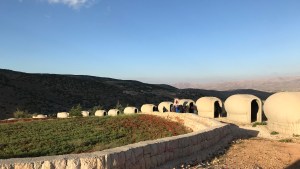The day after the visit of Palestinian President Mahmoud Abbas, it was the turn of acting Lebanese Prime Minister Najib Mikati to be received at the Vatican on December 13, 2024. Against a backdrop of continuing turmoil in the Middle East, the head of government of the “Land of the Cedars” met with Pope Francis, then with Secretary of State Cardinal Pietro Parolin and with the Secretary for Relations with States and International Organizations, Archbishop Paul Richard Gallagher.
The Pope spoke with the Lebanese prime minister for 30 minutes. He presented him with a bronze sculpture titled “Dialogue between Generations,” the texts of his main documents, and an Arabic translation of his newest Message for Peace. For his part, Najib Mikati presented the Pope with an icon depicting the Nativity. The sacred image was created by a priest from Antonine University, an institution founded in 1996 by the Antonine Maronite Order and based in Baabda, on the southern outskirts of Beirut.
Lebanon’s role as an example of peaceful coexistence
During the subsequent talks in the Secretariat of State, “the importance of the good diplomatic relations that exist between the Holy See and Lebanon was emphasized, as well as the importance of the contribution of the Catholic Church and the Christian component to the good of the country,” says the Holy See press release.
It also mentions the economic and social difficulties of the Lebanese population and “the prolonged absence of the election of the President of the Republic.”
Addressing Lebanese politicians at the Angelus on December 1, the Pope launched an “urgent call” for the immediate election of a President of the Republic. He expressed the hope that “the institutions return to their normal functioning, so as to proceed to the necessary reforms and assure the country of its role as an example of peaceful coexistence between different religions.”
Since the term of office of the last President Michel Aoun expired on October 31, 2022, Lebanon no longer has a Head of State, but relative continuity of executive power rests with Najib Mikati as acting President of the Council of Ministers. His government has been in a prolonged interim role since 2022, in the absence of a consensus on a new executive.
Third visit to the Vatican
The Sunni leader had already been received at the Vatican on two previous occasions, in 2021 and 2023. This visit took place against an even more turbulent backdrop in Lebanon and in the region. This autumn, the conflict between Israel and Hezbollah intensified, claiming numerous victims among the Lebanese population. It now threatens to resume despite the ceasefire in force since November 27.
“In expressing satisfaction for the ceasefire reached in the south of the country, the hope was reiterated that the peaceful coexistence of different religions would continue to characterize Lebanon’s identity, and be of help and support to peace in the Middle East,” the statement said.
The fall of Bashar Al-Assad’s regime on the night of December 7-8 was followed in Lebanon with a mixture of enthusiasm and fear for the future. An eventual return to peace in Syria could ease migratory pressure on Lebanon, which has seen millions of Syrian migrants and refugees flock there since the war began in 2011.




